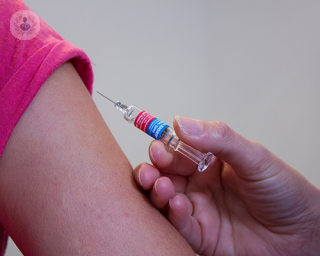
What is cervical cancer?
Cervical cancer is a type of cancer that occurs in the cells of the cervix, which is the lowest part of the uterus that connects to the vagina. Most cases of cervical cancer are as a result of an infection with the human papillomavirus (HPV), which can be passed on through sexual contact with a man or a woman. There are more than 100 strains of HPV but two strains, HPV 16 and HPV 18 are the ones responsible in cases of cervical cancer.
What are the symptoms of cervical cancer?
The symptoms of cervical cancer include:
- Abnormal vaginal bleeding.
- Bleeding during or after sex.
- Bleeding in between periods.
- New bleeding after finishing menopause.
In the early stages, however, cervical cancer can be asymptomatic.
What are the risk factors for cervical cancer?
Aside from HPV, the following are possible risk factors for women:
- Smoking.
- Weakened immune system.
- Taking the oral contraceptive pill for longer than five years.
- Having more than five children.
What happens during cervical cancer screening?
In the UK, the NHS Cervical Screening Programme invites women between the ages of 25 to 64 to attend a screening. Women between the age of 25 to 49 are invited every three years, whilst those aged 50 to 64 are offered a screening every five years.
During the screening, a small sample of cells is swabbed from the cervix and sent to a laboratory for the cells to be checked under a microscope.
An abnormal test result does not always mean that a woman has cervical cancer. It may suggest that it is precancerous or because of the HPV present.
How is cervical cancer treated?
Cervical can be treated with surgery if it is caught in the early stages, which is why regular cervical cancer screenings are important preventive measures. Hysterectomy is the surgical removal of the womb, which is necessary in cases of cervical cancer.
Combined treatments involving chemotherapy and/or radiotherapy is another option for some women.
These treatment options can lead to early menopause and infertility. A multidisciplinary team of specialists, including gynaecologists and oncologists work to treat cervical cancer.
Cervical cancer

What is cervical cancer?
Cervical cancer is a type of cancer that occurs in the cells of the cervix, which is the lowest part of the uterus that connects to the vagina. Most cases of cervical cancer are as a result of an infection with the human papillomavirus (HPV), which can be passed on through sexual contact with a man or a woman. There are more than 100 strains of HPV but two strains, HPV 16 and HPV 18 are the ones responsible in cases of cervical cancer.
What are the symptoms of cervical cancer?
The symptoms of cervical cancer include:
- Abnormal vaginal bleeding.
- Bleeding during or after sex.
- Bleeding in between periods.
- New bleeding after finishing menopause.
In the early stages, however, cervical cancer can be asymptomatic.
What are the risk factors for cervical cancer?
Aside from HPV, the following are possible risk factors for women:
- Smoking.
- Weakened immune system.
- Taking the oral contraceptive pill for longer than five years.
- Having more than five children.
What happens during cervical cancer screening?
In the UK, the NHS Cervical Screening Programme invites women between the ages of 25 to 64 to attend a screening. Women between the age of 25 to 49 are invited every three years, whilst those aged 50 to 64 are offered a screening every five years.
During the screening, a small sample of cells is swabbed from the cervix and sent to a laboratory for the cells to be checked under a microscope.
An abnormal test result does not always mean that a woman has cervical cancer. It may suggest that it is precancerous or because of the HPV present.
How is cervical cancer treated?
Cervical can be treated with surgery if it is caught in the early stages, which is why regular cervical cancer screenings are important preventive measures. Hysterectomy is the surgical removal of the womb, which is necessary in cases of cervical cancer.
Combined treatments involving chemotherapy and/or radiotherapy is another option for some women.
These treatment options can lead to early menopause and infertility. A multidisciplinary team of specialists, including gynaecologists and oncologists work to treat cervical cancer.


When should you visit a well woman clinic?
By Dr Fakher Gendy
2024-11-21
A well-woman clinic is designed to make it easier for women to access speedy diagnostic and treatment services for a range of common issues. Expert consultant gynaecologist Dr Fakher Gendy tells us what kind of problems someone can have investigated at a well-woman clinic and what to expect from the service. See more


Why am I bleeding after intercourse?
By Mr Ashfaq Khan
2024-11-20
What causes a woman to experience vaginal bleeding after sex? Mr Ashfaq Khan, a leading gynaecologist and obstetrician based in London, explores the causes of causes of this condition and explains when you should see a doctor about it. See more


How a cervical smear test works
By Dr Giada Frontino
2024-11-20
A cervical smear test is a gynaecological procedure that checks the health of the cervix and helps prevent cervical cancer. Here, Dr Giada Frontino, renowned consultant Obstetrician and Gynaecologist based in London, provides an expert insight into a cervical smear test. See more


What age should screening for cervical cancer begin?
By Mr Angus McIndoe
2024-11-20
Mr Angus McIndoe, a leading obstetrician and gynaecologist, explains why cervical cancer screening should start from a younger age than the current guideline of age 25. See more
Experts in Cervical cancer
-
Mr Rahul Nath
Obstetrics & gynaecologyExpert in:
- Robotic surgery
- Abnormal smear test
- Cervical cancer
- Endometrial cancer
- Human papillomavirus (HPV)
- Ovarian cancer
-
Professor Susana Banerjee
Medical oncologyExpert in:
- Ovarian cancer
- Endometrial cancer
- Cervical cancer
- Gynaecological cancer
- BRCA gene
- Clinical trials
-
Mr Mohamed Otify
Obstetrics & gynaecologyExpert in:
- Minimal access surgery (keyhole surgery)
- Endometriosis
- Cervical cancer
- Ovarian cancer
- Fibroids
- Ovarian cyst
-
Dr Karin Hellner
Obstetrics & gynaecologyExpert in:
- Colposcopy
- Human papillomavirus (HPV)
- Cytology
- Abnormal smear test
- Human papillomavirus vaccine (HPV)
- Cervical cancer
-
Miss Adeola Olaitan
Obstetrics & gynaecologyExpert in:
- Ovarian cancer
- Uterine cancer
- Endometrial cancer
- Cervical cancer
- Colposcopy
- Robotic surgery
- See all

The Harley Street Clinic - part of HCA Healthcare
The Harley Street Clinic - part of HCA Healthcare
35 Weymouth Street, London. W1G 8BJ
No existe teléfono en el centro.
By using the telephone number provided by TOP DOCTORS, you automatically agree to let us use your phone number for statistical and commercial purposes. For further information, read our Privacy Policy
Top Doctors

LOC at The Harley Street Clinic (HCA)
LOC at The Harley Street Clinic (HCA)
Chemo Day Unit, 81 Harley Street, London
No existe teléfono en el centro.
By using the telephone number provided by TOP DOCTORS, you automatically agree to let us use your phone number for statistical and commercial purposes. For further information, read our Privacy Policy
Top Doctors

Platinum Medical Centre (HCA)
Platinum Medical Centre (HCA)
15 - 17 Lodge Road
No existe teléfono en el centro.
By using the telephone number provided by TOP DOCTORS, you automatically agree to let us use your phone number for statistical and commercial purposes. For further information, read our Privacy Policy
Top Doctors
-
The Harley Street Clinic - part of HCA Healthcare
35 Weymouth Street, London. W1G 8BJ, Central LondonExpert in:
- Cancer
- Head and neck cancer
- Cardiology
- Intensive care
- Diagnostic Imaging
- Women’s health
-
LOC at The Harley Street Clinic (HCA)
Chemo Day Unit, 81 Harley Street, London, Central LondonExpert in:
- Cancer
- Cancer screening clinic
- Medical Oncology
- Chemotherapy
- Stem cell transplant
- Cancer Treatment
-
Platinum Medical Centre (HCA)
15 - 17 Lodge Road, Central LondonExpert in:
- Digestive
- Cancer
- Orthopaedic surgery
- Diagnostic Imaging
- Spine
- Physiotherapy
- See all
- Most viewed diseases, medical tests, and treatments
- CAR-T cells
- Menopause support
- Hormone therapy
- Pelvic ultrasound
- Complex endometriosis
- Migraine
- Maternal mental health
- Hodgkin's lymphoma
- Joint pain
- Nutrition







